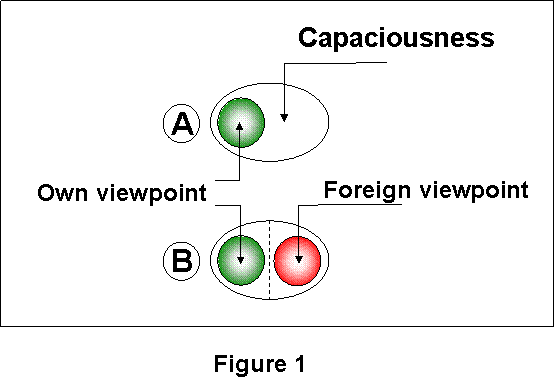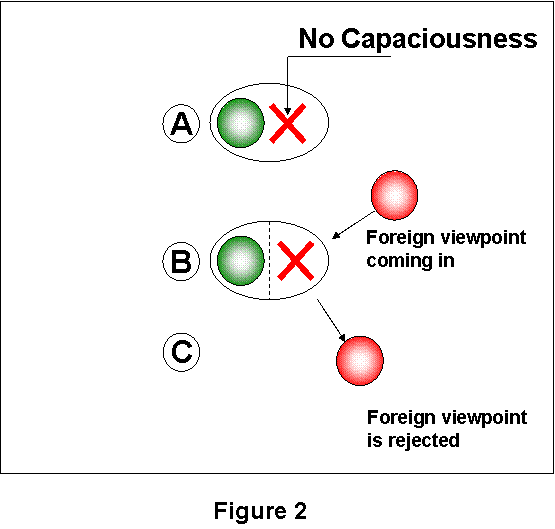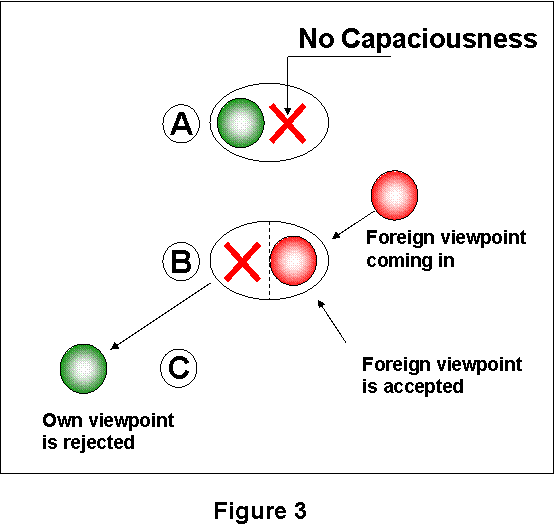 |
Back to Web IVy Content -- Per Schioettz' Articles
"SP"-"PTS" Series 2, March 2011
(c) 2011 by Per Schioettz, per1909@gmail.com
|
|
Capaciousness March 23, 2011 by Per Schioettz "SP" - "PTS" - series 2
Capaciousness is here defined as the ability to encompass new viewpoints. So, if one person thinks the Earth is flat, and somebody else comes along with the viewpoint that it is round as a ball, a capacious person should be able to encompass this new, foreign, and very strange viewpoint.
In Figure 1 you can see that illustrated. The person has his own viewpoint (A), but there is also room for new and different viewpoints. The foreign viewpoint is effortlessly taken in because there is capaciousness (B). The two viewpoints can now be evaluated in relation to each other, particularly if they contain data of comparable magnitude. (The idea that the Earth is flat can be compared with the idea that it is spherical, but not with the idea that "I know best" or "carrots are healthy"). When they are being evaluated and compared and "touched", there is a possibility of learning something new, and of understanding the new stuff, and realizing what it encompasses and implies. In another example, own viewpoint could be "I don't have any fixated ideas" and suddenly the wife or the friend says: "What you are saying, I have heard many times before, it seems like a fixed idea". If there is room for that other viewpoint, meaning there is capaciousness, then now is a chance of evaluating the two viewpoints in relation to each other. For example, one could ask oneself: "Why is she saying, it seems like I have a fixed idea?", "What am I saying or doing that makes her have that opinion?" When there is sufficient capaciousness to encompass one additional or several other viewpoints, then there is a chance of evaluating further, get familiar with the territory, and getting a better understanding of what is happening and how one is responding - and then one can progress in one's own development. That was Figure 1.
Figure 2 (A) shows a person who isn't capacious, who doesn't have room for a new, different, foreign, or provocative viewpoint (B). He will promptly reject the new and different viewpoint (C) - WITHOUT in any way evaluating, analyzing, feeling, or in any other way sensing the other viewpoint. It is rejected immediately, there is no room, it doesn't even enter his space - and that would be the first requirement for evaluating it. It can be extremely frustrating to deal with a "Figure A - Non Capasciousness" person if you really want to introduce him to a way of doing something; something you KNOW will help him with what he is trying to accomplish. Maybe you actually have more experience with the subject than the other person. Any educator has experienced this. Not until he gets the student to be willing to contain a new viewpoint in his space, will the student be able, in any way, to learn something new. You will often notice this in situations where it is taking a person an exorbitant amount of time to learn something new. The new data can be repeated again and again. At some point one might get lucky and repeat it at a time when the student is suitably high on the tone scale, where there is more room and more capaciousness. Suddenly it sinks in. Capaciousness has appeared. When studying something new, a lack of capaciousness can give problems that might not have been noticed before. A lack of capaciousness, which often shows itself as fixated or stuck ideas, won't make room for the new ideas that inevitably will surface when studying something new.
The person who isn't capacious, Figure 3 (A), but only has room for one viewpoint at a time, might also, when a new viewpoint appears (B), immediately reject his own old viewpoint and take on the new one (C). The old viewpoint is rejected IMMEDIATELY. The new one is not evaluated, it is not being examined and analyzed or felt out, it hasn't really been perceived. He doesn't have room for two viewpoints, and he is so uncertain about the one he has, that he immediately rejects it in favor of the new viewpoint. This kind of person can seem very naive and easily controlled by authority. If you are vacationing in a cabin without electricity, and you ask such person to go and find the "kerosene vacuum cleaner", he will probably start looking for it immediately. His own viewpoint, that vacuum cleaners run on electricity, not on kerosene, gets rejected the moment you give him the idea of the kerosene vacuum cleaner. He will be very uncertain about his own views because of the very small, or totally lacking, capaciousness. He might seem like somebody who will "learn" new things with lightening speed, but his understanding of those new things is found in a very small place. The new ideas are accepted with closed eyes, plugged ears, and an unfeeling rigidity. If you check his understanding he might be able to rattle off the accepted viewpoint, but he will not be able to use it for anything sensible, since he hasn't understood it, examined it, or felt in his heart what it is about. Capaciousness is obviously very important if one wants to learn new things. The inability to contain new viewpoints is the biggest barrier, also when it comes to the mutual understanding between people. If you can't contain one other viewpoint, how can you possibly contain a whole other person with many other viewpoints? In marriages and other close relationships between people it often happens that a viewpoint can't be contained. The viewpoint is rejected by some kind of judgment: "That idea of yours is crazy", "You are crazy", "Do you really believe that yourself?" If the different viewpoint is accepted and one's own viewpoint is rejected instantly because of lacking capaciousness, then the judgment will often be about oneself. "My idea is crazy", "Where did I get that from, I better reject it immediately, or the others will think I am stupid". "Others are smarter than me", "I am stupid". Here goes the self-invalidation, the making self smaller, the true source of PTS-ness. (There might not be an "SP" within miles... !!!) When ideas are rejected without being felt or analyzed, then we often need a reason for it. We need an explanation, mostly for ourselves. Lack of room is not seen as a reason, so we invent reasons. The rejection of new viewpoints from others can be explained with: "I know best", "Don't think you are something", "Anything new is dangerous", etc., etc. Own viewpoints can be rejected and the rejection justified with: "I lack confidence", "I can't trust myself", "Nobody can understand my views", "Communication is of no avail". How is your own capaciousness? Is it large? Do you find it very easy to make room for the viewpoints of others, or for your own? Are you listening to other's viewpoints? Are you listening? Are you interested? Try to sense your own capaciousness over the next couple of days. Feel it. What happens when other viewpoints are impinging, trying to enter your space? What do you do with them? What do you do with your own viewpoints? Notice what is happening. If you suddenly find yourself in a group where two or more people are talking at the same time, then you can be 100% certain that at least one person isn't listening. Who is it? Is it yourself? Are you interested, or are you trying to be interesting? Where is your capaciousness? Where is the other person's capaciousness? Evaluating viewpoints, own or others, mainly consist of seeing differences, similarities and identities. Sometimes this can be hard and another person's guidance (coaching) can be very beneficial. See the article "How can I gain more freedom". "SP" - "PTS" Series 3. You can get much enjoyment out of observing your own capaciousness in relation to other people and other viewpoints. It will get bigger simply because you start observing it. You notice it and it will be allowed to develop. There will be space for the capaciousness, and then there probably aren't many more limits after that. Freedom is NOT a quantity even though some might want to persuade you about that. Freedom is a QUALITY, a quality of viewpoint monitored by your capaciousness. Try it! Per Schioettz
From Freedom to Fear and Back "SP"-"PTS" Series 1 << >> THERE ARE NO "SUPPRESSIVE PERSONS" "SP"-"PTS" Series 3
|


